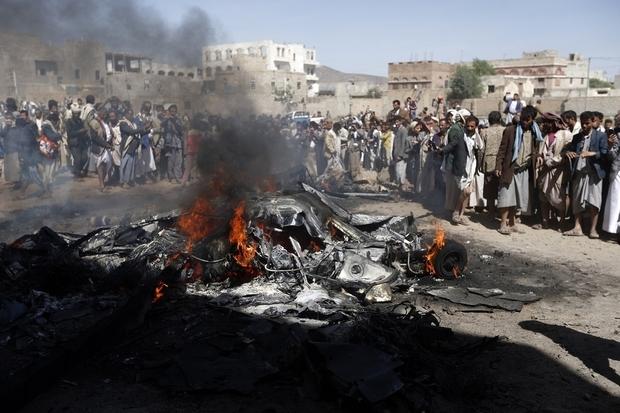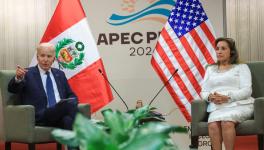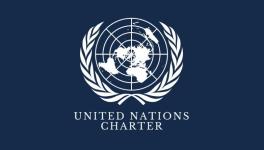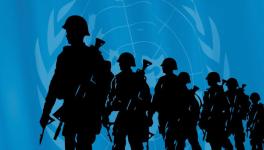14 civilians Killed in Bombing by Saudi-led Coalition in Yemen

Image Courtesy: Middle East Eye
As the war in Yemen entered its fourth year, the U.S.-backed international coalition led by Saudi Arabia on Monday bombed a housing complex, killing 14 civilians from a single family. Seven children, many of whom were less than 10 years old, were among those killed in the airstrike in al-Hali district of Yemen’s coastal city of Al Hudaydah, which has been the refuge of millions who have been displaced by the war from other provinces.
The Saudis claim the airstrike was targeted at Houthi militants, and that they are investigating the death of civilians. Abdulrahman Jarallah, director of the city health bureau in Al Hudaydah, refuted the Saudi claim, saying that there had been no military presence nearby.
Most the civilians were out in open for a breath of fresh air amid the simmering heat when the airstrikes blasted them into pieces. “Ambulances could not cross into the targeted areas due to the intensity of the jets,” said Jarallah. Only two of the victims have been identified.
The footage of Red Crescent paramedics struggling amid the debris to collect body fragments and burnt corpses, including that of a newborn, has been reported to be too graphic for publication by most media agencies.
The thousands of airstrikes carried out by the coalition have killed about 10,000 and displaced millions since it intervened in Yemen in 2015 against the Shia-majority Houthis to reinstate ousted President Abdrabbuh Mansur Hadi. The war has led to a catastrophic humanitarian situation in the country.
According to a recent humanitarian update by the UN Office for the Coordination of Humanitarian Assistance (OCHA), currently 22 million people - roughly 75% of the population - are in dire need of humanitarian assistance. It also notes that around 50% of the country’s health facilities are not functioning due to the war, and 16 million (55%) people have no access to safe drinking water supply.
The destruction of crucial healthcare and sanitation infrastructure in the country has caused an outbreak of cholera, which, according to U.N, is one of the worst in modern history.
The Saudi-led international coalition includes Sunni-dominated countries from the region, while the United States, United Kingdom and France provide logistical aid, mid-air refuelling, and intelligence coordination support. While an air and naval blockade has been imposed on Yemen, allegedly to prevent arms smuggling, weapons continue to flow to Saudi Arabia from the U.S and U.K. According to recent data released by Stockholm International Peace Research Institute (SIPRI), in the period between 2013-2017, Saudi Arabia has been the world's second largest arms importer, with 61% of the weapons coming from the U.S and 23% from the U.K
"If the United States and the United Kingdom, tonight, told King Salman [of Saudi Arabia], ‘This war has to end,’ it would end tomorrow. The Royal Saudi Air Force cannot operate without American and British support,” a CIA veteran and senior fellow at Brookings Institution is reported to have said.
Last week, on March 26, as the war entered its fourth year, tens of thousands of Yemenis at Sanaa's Sabaeen Square protested against the international aggression and called for an end to the war. Attempts by the coalition to repair their credibility through steps such as the billion dollar aid package proposed by Saudi Arabia and the UAE are unlikely to appease the millions whose lives have been wrecked by the conflict.
It seems that no human cost is too high in pursuit of the Anglo-American agenda to check any possible expansion of Iranian influence in the region.
Get the latest reports & analysis with people's perspective on Protests, movements & deep analytical videos, discussions of the current affairs in your Telegram app. Subscribe to NewsClick's Telegram channel & get Real-Time updates on stories, as they get published on our website.
























